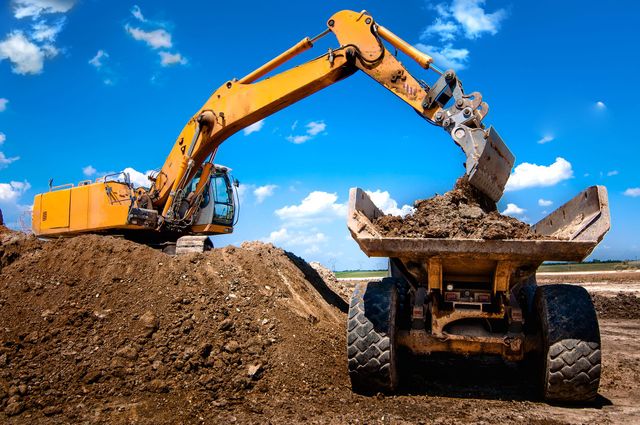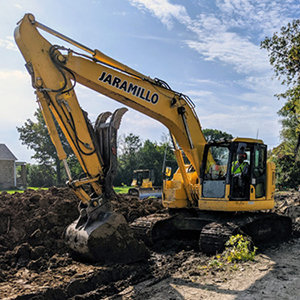Affordable Lancaster Excavation - Top Quality Excavation at Competitive Costs
Affordable Lancaster Excavation - Top Quality Excavation at Competitive Costs
Blog Article
Comprehensive Excavation Techniques: Grasping the Basics for Success
The mindful planning, exact execution, and meticulous interest to information needed in excavation tasks demand a detailed strategy that incorporates numerous essential aspects. The true mastery exists not merely in recognizing these fundamentals but in flawlessly incorporating them to navigate the intricacies of excavation projects with finesse.
Recognizing Excavation Task Preparation

Successful excavation jobs are improved the structure of precise and comprehensive preparation. The first phase of any excavation task is the planning phase, where important decisions are made that can substantially affect the outcome of the job. During this stage, it is vital to gather all pertinent details about the site, consisting of topographical studies, dirt make-up, and any possible hazards that may exist. Recognizing the project range, budget plan, and timeline constraints is vital for creating a detailed excavation plan that makes certain the job's success.
One trick aspect of excavation project preparation is the development of a comprehensive timeline that lays out the sequence of deadlines, milestones, and activities. This timeline acts as a roadmap for the project team, enabling them to track progression and make required modifications to guarantee the task stays on schedule. Furthermore, a well-defined budget that makes up all expenses, consisting of equipment leasing, labor costs, and products, is crucial for staying clear of price overruns and hold-ups. By thoroughly considering all these factors throughout the drawing board, excavation jobs can be performed successfully and efficiently, causing successful outcomes.
Dirt Analysis and Website Assessment
Carrying out comprehensive dirt analysis and website analysis is an essential action in the prep work phase of any type of excavation project. Dirt analysis entails identifying the make-up, structure, and residential or commercial properties of the dirt at the excavation site. This info is important for recognizing the dirt's bearing capacity, moisture material, and potential for erosion, which are crucial elements in determining the excavation methods and equipment required for the job.
Site analysis surpasses soil analysis and encompasses a more comprehensive evaluation of the overall website problems. This assessment consists of recognizing any kind of prospective risks, such as below ground utilities, environmental issues, or unsteady terrain, that might affect the excavation procedure. By extensively examining the website, task managers can establish reliable excavation approaches that focus on security, efficiency, and environmental management.
Using innovative innovations like ground-penetrating radar, soil tasting, and drone studies can boost the accuracy and performance of dirt evaluation and website analysis. Investing time and sources in these initial actions can eventually conserve time and avoid pricey hold-ups or issues during the excavation procedure.
Devices Selection and Application
Effective excavation tasks depend heavily on tactical tools selection and use to make sure ideal performance and productivity. Selecting the best equipment for the work is crucial in optimizing efficiency and lessening downtime. Aspects such as the kind of soil, deepness of excavation, and project extent play a considerable duty in determining the most appropriate tools for the task handy.

Along with selecting the proper devices, proper utilization is essential to job success. Operators has to be trained to take care of the equipment safely and successfully - septic ohio. Normal maintenance checks and prompt repair services help protect against breakdowns and make sure regular efficiency throughout the job
Safety And Security Actions and Regulations Compliance
In the realm of excavation projects, focusing on safety and security steps and conformity with laws is vital to making sure a lawfully sound and safe operational atmosphere. Precaution include a variety of methods, including carrying out complete website evaluations, applying correct signs and obstacles, and giving adequate security training for all workers associated with the excavation process. Adherence to guidelines, such as OSHA top article demands in the United States, ensures that the excavation project satisfies the essential requirements to secure employees, bystanders, and the surrounding setting.

Monitoring Development and Adjusting Methods
How can project managers effectively track the improvement of excavation projects and adapt their approaches as necessary to optimize results? Tracking progress is essential for making sure that excavation tasks stay on track and meet deadlines. Project supervisors can utilize different devices and methods to track development, such as day-to-day report card, routine website examinations, and advanced monitoring technologies like drones and GPS tracking systems. By constantly keeping an eye on the project's improvement, managers can determine any prospective delays or issues early on and take proactive steps to address them.

Final Thought
Finally, understanding the principles of comprehensive excavation strategies is vital for the success of any kind of project. By understanding job preparation, examining dirt and site problems, selecting proper tools, abiding with safety and security guidelines, and keeping an eye on progress, project managers can make sure a effective and smooth excavation procedure. Applying these techniques will certainly cause effective outcomes and minimize potential threats or troubles during the excavation project.
The preliminary stage of any type of Get More Information excavation project is the planning phase, where vital choices are made that can considerably affect the original source the result of the project. Comprehending the task timeline, budget, and extent restraints is crucial for producing a detailed excavation strategy that makes certain the project's success.
Just how can forecast managers properly track the advancement of excavation projects and adjust their strategies appropriately to enhance outcomes? By carefully keeping an eye on progression and being willing to adapt methods, job managers can enhance the general success of excavation tasks.
By recognizing job planning, evaluating dirt and site conditions, selecting ideal equipment, abiding with security guidelines, and monitoring progression, task supervisors can ensure a reliable and smooth excavation process.
Report this page